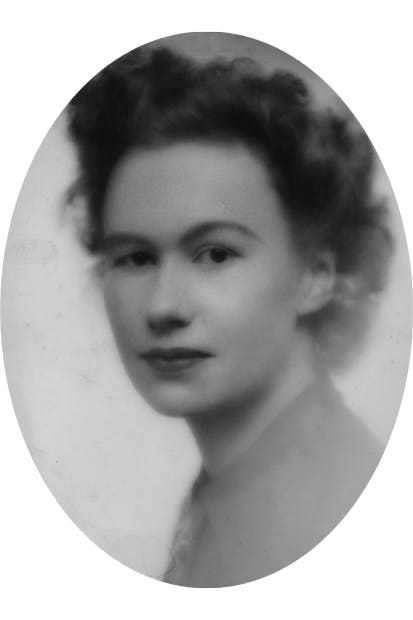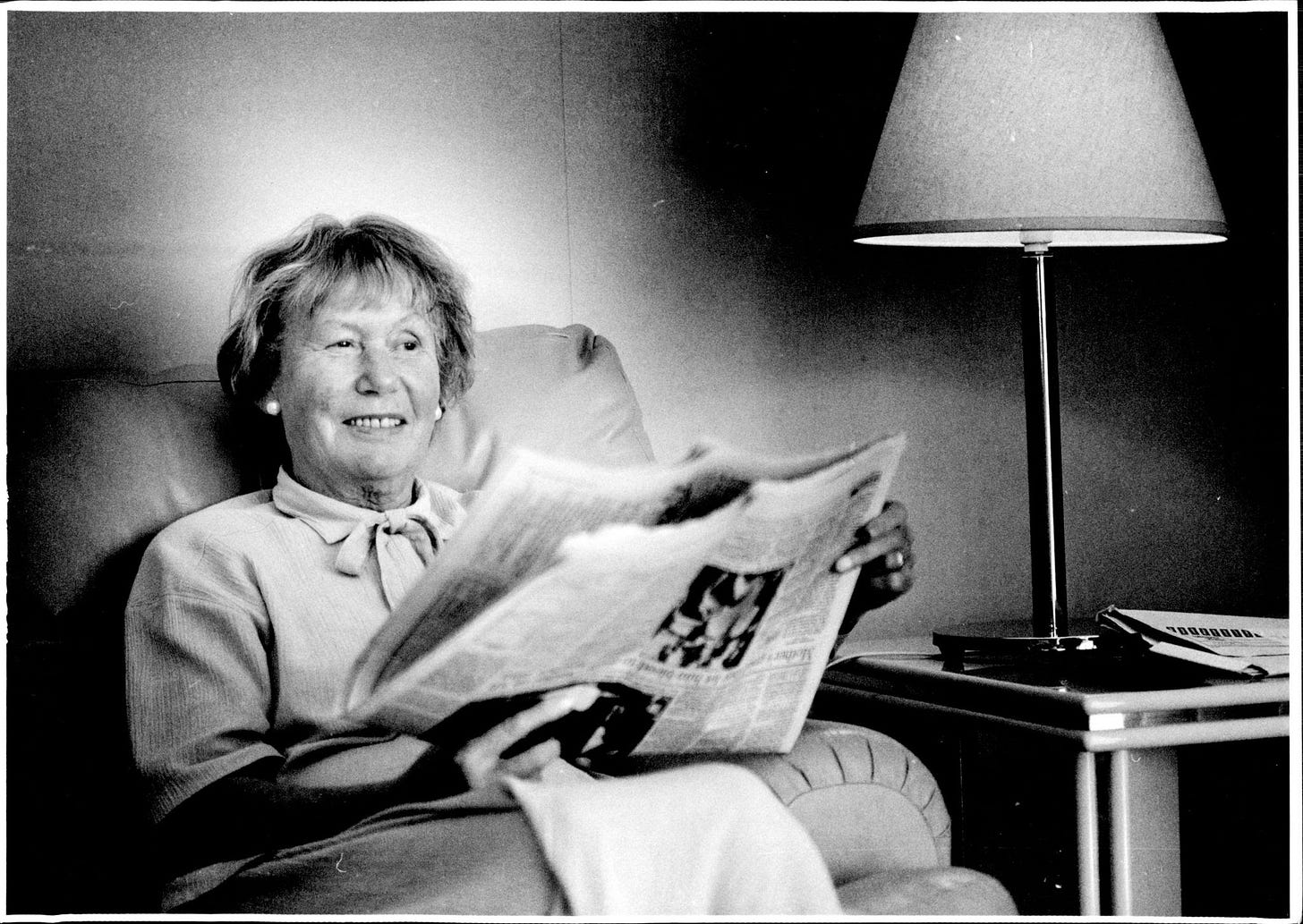Penelope Fitzgerald succeeded because she wasn't a prodigy
Penelope Fitzgerald was supposed to be a prodigy. Her father edited Punch, and her aunts and uncles were, variously, World War II code breakers, novelists, prominent clergymen (Catholic and Anglican), founding members of the Detective Club, that sort of thing. It was ‘a family where everyone was publishing, or about to publish.’ Her mother and grandmother had both gone to Somerville College, Oxford, and her grandfathers had both been Bishops.
After an intensely competitive childhood among her uncles (her mother died young), she too went to Somerville, and got such an impressive First Class degree that her exam scripts were bound in red covers and preserved in the college archives. When she left Oxford she told the university magazine that she was ready to start writing.
She got a job at the wartime BBC, founded a literary journal that published Franny and Zooey by J.D. Salinger, and probably helped her husband write his history of the Irish Guards. By the time she was having children, she was already in her mid-thirties. But no novels had arrived.
From here on out her life was a catastrophic disaster. The family had to leave London very suddenly, presumably because of debts, and ended up in Southwold, a small fishing town on the east coast of England. Desmond, her husband, was an alcoholic, whose legal career never took off enough to tank. Their time in Southwold was often spent sitting outside pubs, waiting for Desmond to have finished soaking. When they eventually moved back to London they could only afford to live in an old river barge, moored in Chelsea.
This was not the low point. Desmond stole money from his chambers, came home steaming drunk when they found out, fell off the boat and cut his head badly. He was disbarred. Sometime after the boat sank — for the second time, this time permanently — and they had to live in homeless shelters. Eventually Penelope found a letter offering them a council flat that had been in Desmond’s pocket for six weeks. Throughout this period, and until after retirement age, Penelope did the drudge work of being a teacher at an Oxbridge crammer. Desmond washed up as a clerk at a travel agent.
Her days as an anticipated prodigy were very far behind her indeed. And she never had started writing, with the exception of a short story in the 1950s. She would be fifty eight when her first book — a biography of Burne Jones — appeared. She started writing it after her father died. When Desmond became terminally ill a few years later, she wrote her first novel to amuse him, which she published aged 61. She then spent the last twenty five years of her life writing some of the best novels written in English in the twentieth century.
So what kept her waiting so long?
The obvious answer is Desmond. That’s certainly one major conclusion you can infer from Hermione Lee’s excellent biography. Philip Hensher set the tone for most reviewers in laying the blame unforgivingly at Desmond’s feet. And there’s some truth in that. Penelope had to hold the family together: practically, emotionally, financially. She slept on a fold up sofa bed on her own after 1960, without her own bedroom. Her children ran wild, not attending school for part of 1961-62. Without Desmond, the implication is, the prodigy might have got started thirty years earlier. As Rosemary Hill said, ‘child-rearing, teaching, a difficult marriage and the constant struggle to keep the family afloat… left little time for writing.’
There are ways of seeing Fitzgerald as a writer who was cut off. She wrote stories as a child, contributed anonymous pieces to the Times Literary Supplement, wrote a short story in middle age, helped Desmond with his history, contributed to the university paper. Lee believed Fitzgerald had, ‘all the makings of someone who would start publishing in her fifties.’ And one academic has made use of this material to claim she wasn’t a late bloomer at all.
The lone voice who sees it the other way is James Wood. Unlike many commentators, he sees clearly that it is the death of Penelope’s father, not her husband, that started her writing. And he sees the benefit of the delay.
Lee is oddly incurious about the question that must occur to every reader: why did Fitzgerald wait so long to start writing? The obvious answer is that she had three children, a wayward husband, and was earning a living—and yet you feel that, during the nineteen-sixties, had she started also writing, things could hardly have gone worse for the family.
Like Woods, I want to give Fitzgerald more credit than the belief that she was merely the victim of marriage. Great art finds a way. Many writers have lived through poor conditions and produced their work. Psychological factors — and the benefit of the delay — are also crucial.
Certainly it seems relevant that Fitzgerald started to write after her children were old enough to leave home and take care of themselves. Was it also significant that she started writing shortly after the death of her father? Did some Knoxian combination of insecurity and confidence hold her back until she could be sure of avoiding public failure? “Decision is torment for anyone with imagination,” a character says in “Offshore.” “When you decide, you multiply the things you might have done and now never can. If there’s even one person who might be hurt by a decision, you should never make it. They tell you, make up your mind or it will be too late, but if it’s really too late, we should be grateful.” Potential remains potent if unused.
We do know that Penelope was a bit hopeless in her own right. Her daughters reported in the biography that she barely knew what a mortgage was. When the boat sank, one set of family friends said that was exactly the sort of thing you expect of the Fitzgeralds. She, as well as he, was hopeless with money.
To think about Penelope’s delay another way, let’s ask an important counterfactual. Without the late start, what would Penelope have written about? It seems unlikely to me that novels about Oxford or her upbringing would have been much good. She might have done what Evelyn Waugh did and turned her first job into a novel, and then moved onto her social life. And those might well have been good novels of their sort.
But what she ended up producing was so original, so different, so mysterious, I for one can only feel glad she didn’t follow the path that so many other young novelists pursue. Her early works are all about different periods of misery in her life: the bookshop in Southwold, the boat that sank in Chelsea, the grind of teaching, the haunting despair of unrequited love at the BBC.
These are not simply English novels, and she was not simply an English lady novelist — as so many of her early reviews myopically dubbed her. All throughout her years of drudgery and teaching, Penelope was giving herself a second education. The strictures and expectations of her upbringing and Oxford were put aside. As an adult, she traveled all over Europe and to Mexico. She learnt languages like German and Russian, she sat in the rafters to listen to opera, and she read, and read, and read. She was immersed in European culture and becoming a European writer.
Her annotated books are held in the British Library and they are the key to her art. Lee has marvellous passages showing the marginal notes Penelope made. This makes clear the profound influence of Becket, Joyce, Balzac. And she learnt structure and technique from her teaching. When she was assigned to teach George Eliot her heart sank; she ended up as a passionate admirer of Middlemarch. Her copies of Jane Austen are full of comments about how Austen controls the action. Frank Kermode became important to her understanding of the novel. Writers like Ford Madox Ford are noted for their establishment of theme through language.
As Lee tells us, she has a sharp eye for detail — the eye, I would say, of someone studying novels to learn their techniques.
Who apart from her has made a note of Christopher Jackson, the carpenter, mentioned once, hired to build the stage for the family theatricals in Mansfield Park? ("JA's art, this character never appears.") In Bunyan's Pilgrim's Progress, it is not the glorious and triumphant utterances of Honest and Valiant-for-Truth crossing the river ("Death, where is thy sting?") which she marks, but the presence of the unnamed "many" who accompanied them to the riverside. Her note reads: "Real people in background".
This prolonged, often self-directed, immersive education into the languages, literatures, music, and art of Europe — covering France, Spain, Russia, Germany — is central to her writing. The Bookshop is a Balzacian novel. Human Voices is based on a poem by Heine (something no-one noticed at the time). The Beginning of Spring owes a lot to her package holiday to Moscow, taken during the misery years. Without her working knowledge of German she couldn’t have spent two years studying Novalis’ letters in order to write The Blue Flower.
Penelope Fitzgerald revived the historical novel as a serious genre, and she created a new sort of English-European fiction that no-one has managed to replicate. Without her incredible second education — made out of the tormenting failures of her life, as well as her life-long studying — it seems unlikely she could have been the sort of writer she did.
I deeply believe that not only was Penelope Fitzgerald a natural late bloomer, she was also a scholarly novelist, one who needed all that misery and all that time to immerse herself in European culture.
If she had been a prodigy, she might not have been any good.
Penelope Fitzgerald’s novels are all excellent (US link), especially Offshore, The Bookshop, The Gate of Angels, The Beginning of Spring, and The Blue Flower.
You can listen to Penelope interviewing another novelist here. It’s a wonderful interview.
My review of The Gate of Angels
The Clerk’s Tale and the expectation of astonishment
The best contemporary reviews of her novels were by Bernard Levin, which are in The Times digital archive, usually accessible through your local library.
Thanks for reading. If you’re enjoying The Common Reader, let your interesting friends know what you think. Or leave a comment at the bottom.
If you don’t subscribe to The Common Reader, but you enjoy reading whatever’s interesting, whenever it was written, sign up now.




Having just finished reading Offshore, I found your article fascinating and it answered many questions about the novel. Thank you!
I am very interested in your comments. I think I have alad hready mentioned how much I enjoy reading Penelope Fitzgerald. I am not at all sure about what you actually mean by the word prodigy. Also it seems that you imply somehow that trauma of various sorts might have been good for her work. I can't understand that viewpoint really. I think she probably inherited some good genes and was highly intelligent and worked extremely hard. I also thought Hermione Lees book excellent particularly on the writing of each of her books.
I an aware of James Wood and intend to read him- I have only come across him in the LRB and have only been reading he NYRB for a short time. I am interested in what you say about her being an European novelist in the widest sense. I would like to get into Fitzgerald's biographies- Charlotte Mew seems to be having a revival! . Many thanks for your fascinating post.